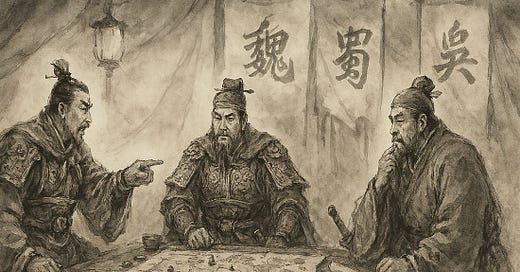First published as
IF CHINA HAD SEVERED TIES WITH RUSSIA THREE YEARS AGO... JUST THINKING ABOUT IT IS FRIGHTENING
Cheng Yawen (程亚文)
Published by Guancha.cn on 25 February 2025
Translated by James Farquharson
(Illustration by OpenAI’s DALL·E 3)
PREAMBLE
Today’s commentary by Cheng Yawen, explaining China’s stance towards Russia since the outbreak of the war in Ukraine, is an important one. In my view, it stands among the most insightful pieces to have been written on this topic by a Chinese analyst within the PRC since Russia’s invasion. Grateful to James for his excellent parsing and translation of this text.
"Individuals may 'sacrifice their lives for righteousness', but a nation cannot afford to do so. A nation that cannot even guarantee its own survival has no place to bluster about morality."
Thomas des Garets Geddes and James Farquharson
reposted on 1st April, 2025 in
Readers may be familiar with the ongoing debate among Chinese intellectuals regarding their country’s stance on Russia’s invasion of Ukraine. Following the recent seismic jolts in US support for Ukraine, Cheng Yawen (程亚文) provides a necessary update. As with Zhao Huasheng (赵华胜), Cheng comes down on the side of “interests” over “values”, arguing that China’s strategic instinct has been vindicated. Cheng’s views—which are grounded in an analysis of Chinese history—are based on the idea that although upholding the sovereignty of small nations is a noble principle, doing so ultimately depends on painful compromise with great powers.
Chinese intellectuals’ stances on the current war are frequently informed by their appraisals of the historical Sino-Soviet relationship. While Feng Yujun (冯玉军)—whose views Sinification has covered extensively—argues that close relations with their Eurasian neighbour have usually been detrimental to China, Cheng contends that the relationship has, at different times, both benefited and harmed his country.
A particularly salient episode in this historical debate is Mao’s decision in October 1950 to follow Stalin’s lead and intervene militarily in the Korean War. Shen Zhihua (沈志华), China’s pre-eminent historian of the Sino-Soviet-DPRK triangular relationship, has argued that Mao prioritised China’s moral reputation within the value system of international socialism when he defied his generals’ concerns that fighting against American troops would harm their country’s interests. Shen believes that the resulting Cold War alignment was detrimental to China, and has recently warned against a return to it. Others have embraced values-based interpretations; the left-wing intellectual Wang Hui (汪晖) once invited ridicule from a noted historian for stating that China’s commitment at the time to international revolution ought to transcend a narrow conception of the national interest.
This tension between moralistic claims on the political order and pragmatic compromise—or maximalist versus limited conceptions of sovereignty—recurs throughout China’s history. Cheng mentions the example of the principled yet futile resistance of certain Ming loyalist scholars to the Manchu invaders during the Ming-Qing transition. During the subsequent Qing Dynasty’s faltering final decades, scholar-officials who clung to purist positions on China’s sovereignty in its diplomatic relations were known as the qingliu (清流 or “pure stream”). This group was notorious for excoriating officials such as Li Hongzhang (李鸿章), who engaged in the grubby business of compromises and strategic balancing with foreign powers—including by attempting to align with the Russian Empire against Japan in the resolution of the 1894-95 Sino-Japanese War.
Regarding memories that are rawer still, Cheng’s reference to historians with personal experiences of the Japanese invasion during the 1930-40s—such as Niu Xianzhong (钮先钟) and Ray Huang (黄仁宇)—calls to mind China’s most recent historical experiences of limited scope to exercise sovereignty. It is a reminder—if needed—of how China’s history shapes the views of its intellectuals today.
– James Farquharson
Key Points
A large segment of Chinese public and scholarly opinion was critical of their government’s tacit support of Russia during its invasion of Ukraine, arguing that their country should “stand on the side of justice”.
However, if implemented, this would risk having both the US and Russia simultaneously turn on China. Trump’s recent rapprochement with Putin has made clear that this was a real possibility.
US politicians and intellectuals have for some time expressed the will to align with Russia against China; China’s early decision not to condemn Russia has significantly shrunk the possibility of this strategy attaining success.
As a rule, allying with a greater power (the US) against a weaker power (Russia) is strategically unwise, given the risk of the greater power turning on you once the weaker power has been eliminated.
A close historical analogy is the Song dynasty’s misguided and repeated decisions to ally with stronger rivals against weaker ones, such as the Mongols against the Jin, which lead to its eventual annihilation by the Mongols.
China’s experience of full-scale invasion by Japan in the past century informs its perspective that pragmatic interests must be placed above assertions of moral values.
Ukraine’s geopolitical position and the weakness of its pre-war institutions meant it lacked complete sovereignty; its legally-recognised sovereignty was only guaranteed by an agreement between two great powers.
Due to fragmentation and polarisation in their immature democratic institutions, Ukrainian politicians—while “morally” in the right—failed to recognise its limited space to exercise full sovereignty, prioritising principles over interests and refusing to compromise with Russia.
Given the risk of fallout, China should prioritise peace and concord in its relations with other great powers as it rises. This necessitates compromising on certain principles such as the sovereignty of weaker nations.
In the face of the “end of globalisation”, China, Russia and America should pursue a renewed “Big Three”-style collaboration to re-establish a stable global order and help avert a looming global catastrophe.





